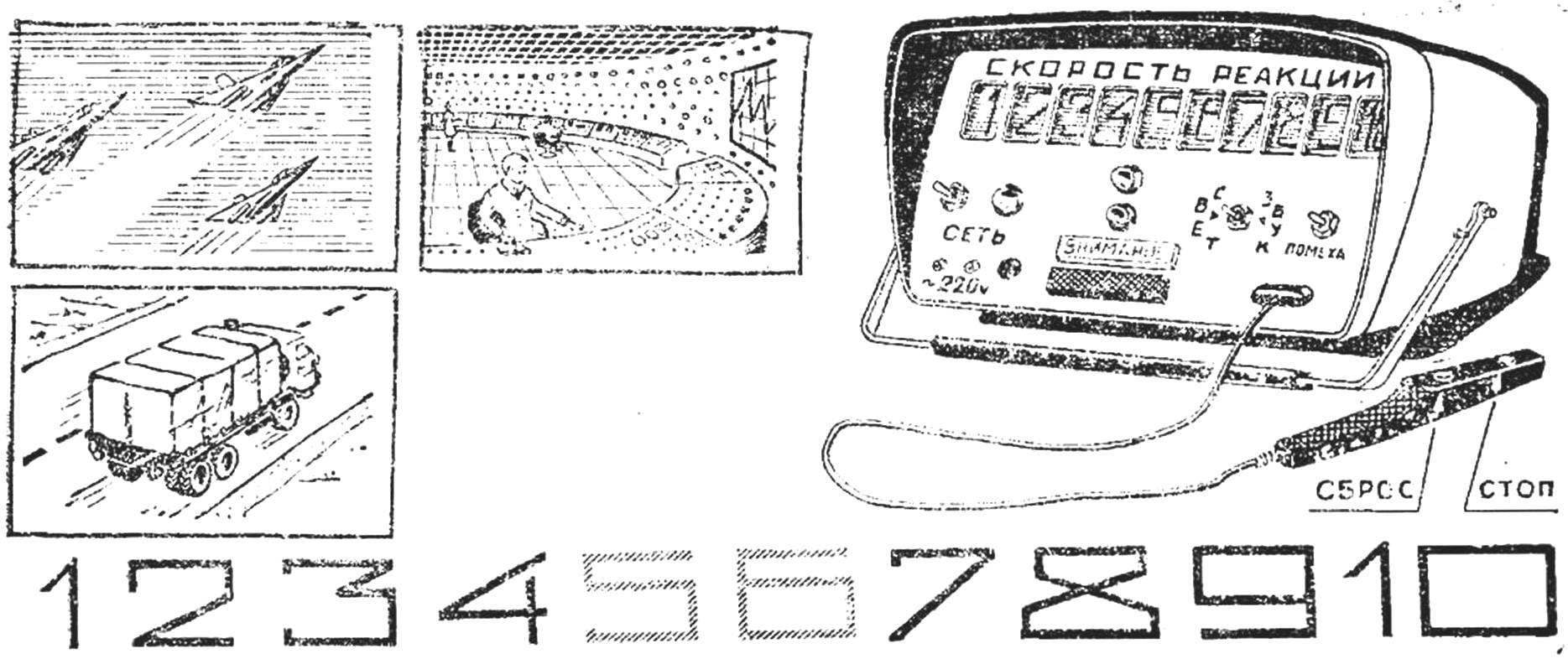 Good response – what is it? More correct to say “speed of reaction” is the time that elapses between receipt of the alarm to the adoption of concrete measures. For example, the driver reaction time of 0.4 to 1 s depending on the complexity of the track conditions and the type of the vehicle managed by it.
Good response – what is it? More correct to say “speed of reaction” is the time that elapses between receipt of the alarm to the adoption of concrete measures. For example, the driver reaction time of 0.4 to 1 s depending on the complexity of the track conditions and the type of the vehicle managed by it.
Weary or sick person to drive dangerously. But representatives of other professions, such as athletes, pilots, operators – those who needed to make decisions in a matter of seconds, such a device is needed, too. And, perhaps, anyone who wants to be fast, bold and clever, wants to know what his reaction. That is for them a young radio amateurs gorSYuT Ryazan built an integrated device for measuring human reaction rate (see. Fig.)
Show the rate of reaction in numerical values from 0.1 to 1 to 10 tubes separated into three color groups, from 0.1 to 0.4 seconds – green (excellent response), from 0.5 to 0.6 – yellow ( satisfactory reaction] of from 0.7 to 1 s – red (poor reaction).
Together, members of the group worked out the automation and remote control relay circuit ring. The charging time of capacitors C1 – C10 to relay K1 operation voltage – K10 was chosen to be 0.1. According to the formula:
tzar. = R • C = 0.1 to define ratings of C1 – C10 and R1 – R10 (see diagram.).

Schematic diagram of the device for determining the rate of reaction.
Relay K1 – K10 RES-9, designed for operation voltage 27 V (PC4.524.200 passport).
Step-down transformer T1 is wound on a core SH30 X 25. Network coil contains 1320 turns of PEL of 0.2, winding II – 20 turns of PEL 0.5, and winding III – 162 turns of PEL of 0.8.
The rectifier is assembled in a bridge circuit diode V1 – V4, C13 electrolytic capacitor – smoothing filter.
In parallel, the primary winding T1 via the ballast resistor R15 H14 lamp included – “neonka” VT-0.2. The relay K1 is triggered after 0.1 s and their contact K1.1 prepares relay K2 circuit, which, in turn, triggered after 0.1 s after K1. Then contact K2.1 prepares the next relay circuit, short circuit and so on. E., Is 1 second will not work K10 relay.
At the same time contacts K1.2 – K10.2 include alternately at intervals of 0.1 s Relay K11 – K20, which are their contacts K11.1 – K20.1 self-locking, and K11.2 – K20.2 short supply circuits H1 lamps – the H10 . Now, if you press the S2 a “Stop” button and remove power from the K1 – K10, the relay part K11 – K20, which have already been deployed, will remain energized and burning lamps will show the speed of your reaction in fractions of a second.
Press S3 “Reset” circuit is returned to its original state: the reaction can be checked again.
The device delivers the “Start” signal suddenly, thus eliminating the possibility of advance “adapt” to the beginning of the test. This task is assigned to a random pulse generator (ICG), which delivers the light signal, including display on the front panel. The device consists of relays K21 RES9 (passport PC4.524.204), diodes, V5, V6, electrolytic capacitor C11 and resistors R11, R12.
The capacitor C11 is charged to a voltage K21 relay action. NO contacts K21.1, and C11 discharges through R11 and the V5, while not release the relay K21. At the same time the contact K21.2 K24 relay coil connects to the voltage of 27 V. Actuating, it closes the lamp power supply circuit H13 “Start” or call (depending on the position of the toggle switch S5).
In a real situation the operator to work in conditions of interference that impede the right to respond to the main signal. Therefore, in the unit circuit has noise generator, assembled on the K22 relay. A contactor K23 it takes light (lamp H11, H12) or sound (bell H14) interference (depending on switch position S4).
Light interference is a side illumination inscription “Start”: it is not necessary to respond to it. Otherwise, the test will miss the main signal, and the reading speed of his reactions is undervalued.
The device is equipped with a remote manual control with the buttons “stop” and “Reset” to check the speed of reaction of the operators and foot – to test the reaction of the driver.
N. EGIN



